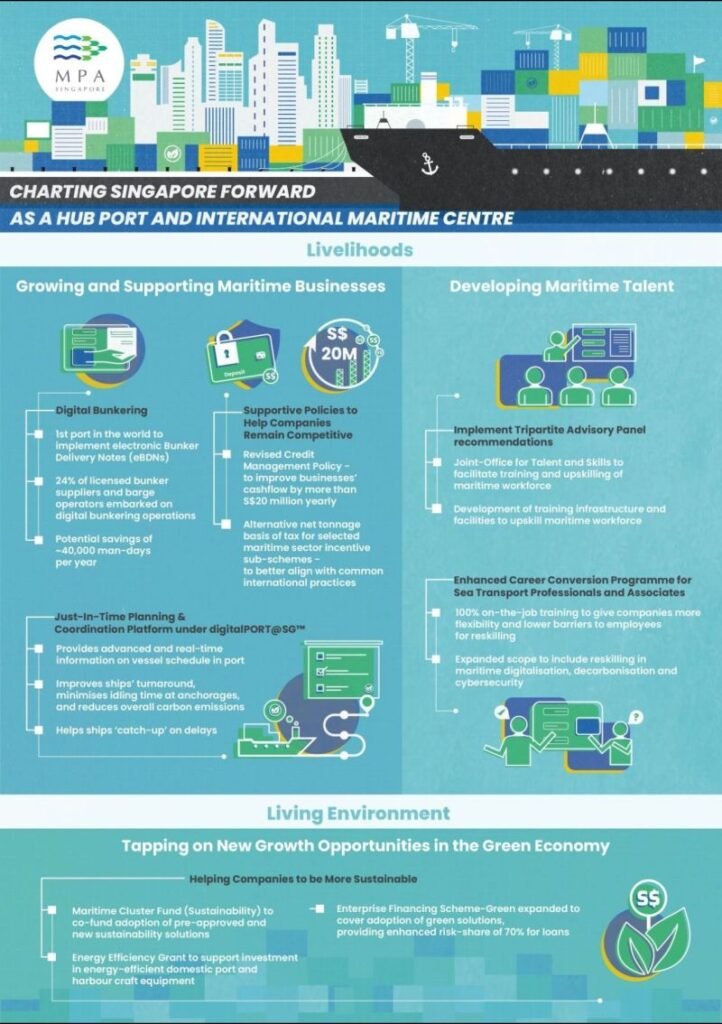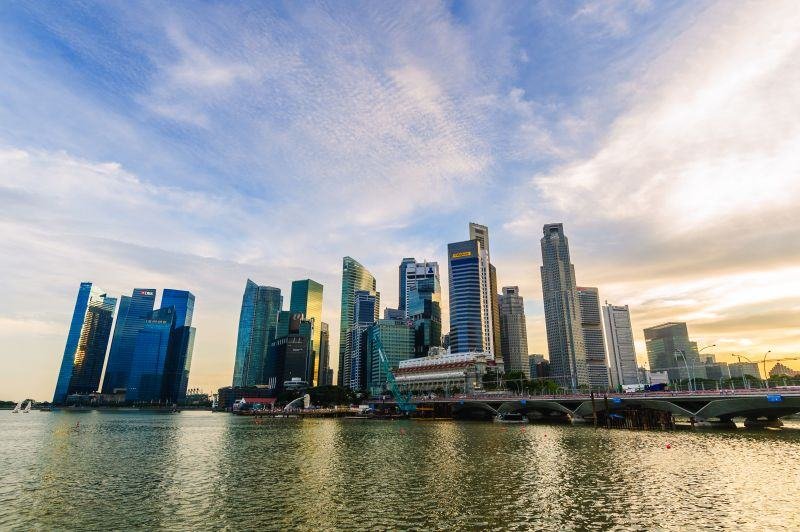Singapore’s Maritime and Port Authority (MPA) has unveiled ambitious plans to propel the maritime sector forward, building upon the key achievements of 2023. With a threefold focus on charting Singapore as a hub port and international maritime center, enhancing the living environment, and nurturing livelihoods, the nation is poised to consolidate its position as a global maritime leader.
Charting Singapore Forward as a Hub Port and International Maritime Centre: The accomplishments of 2023 speak volumes about Singapore’s prowess as a maritime hub. Total business spending by key maritime companies soared past S$4.8 billion, while the annual vessel arrival tonnage in the Port of Singapore surpassed a monumental 3 billion GT for the first time. Notably, Singapore’s container throughput reached an unprecedented 39.01 million TEUs, and the Singapore Registry of Ships exceeded 100 million gross tonnage.
Living Environment – Supporting Green Growth: The introduction of a new sustainability pillar under the Maritime Cluster Fund (MCF) underscores Singapore’s commitment to eco-friendly practices. This initiative will co-fund the adoption of sustainable solutions, complemented by extensions such as the Energy Efficiency Grant and the Enterprise Financing Scheme – Green. Furthermore, the development of Tuas Port remains on track, with three additional berths opened in 2023, signaling Singapore’s dedication to green port infrastructure.
Livelihoods – Nurturing Economic Growth: Efforts to bolster the maritime industry as an economic engine are evident through initiatives like the Just-In-Time Planning and Coordination Platform, aimed at optimizing vessel turnaround time. Additionally, enhancements to the Career Conversion Programme for Sea Transport Professionals and Associates reflect Singapore’s commitment to upskilling and reskilling the maritime workforce for the digital era.
In a recent development, the Committee of Supply has laid out comprehensive plans to bolster the maritime sector in Singapore, emphasizing a dual focus on sustainability and digitalization. The initiatives unveiled are poised to not only fortify the sector’s resilience but also pave the way for long-term growth and environmental stewardship.
The Transport Family’s strategic vision for 2024 underscores a commitment to enhance liveability, the living environment, and livelihoods, with a specific spotlight on the maritime domain. Here’s a breakdown of the key initiatives unveiled:
Sustainability Pillar in the Maritime Cluster Fund: A novel addition, this pillar is designed to incentivize companies to adopt sustainable solutions. With co-funding incentives of up to 30% for non-SMEs and 50% for SMEs, capped at $30,000 per solution, businesses are poised to embrace eco-friendly practices.
Enhanced Energy Efficiency Grant: Businesses investing in energy-efficient equipment stand to benefit from increased co-funding, ranging from $30,000 to a substantial $350,000. This move aims to encourage the adoption of energy-saving technologies, thereby mitigating carbon emissions.
Expansion of Enterprise Financing Scheme: The scheme will undergo an expansion to facilitate the adoption of green solutions. With enhanced risk-sharing of 70%, financial institutions will be empowered to extend lending support to local enterprises engaged in eligible activities, such as greening harbourcraft fleets.
Tax System Adjustments: Aligning with international norms, the tax regime for shipping entities will witness an alternative basis of taxation based on the net tonnage of ships, offering companies greater flexibility and alignment with global practices.
Joint Office for Talent and Skills: The establishment of a collaborative venture between the Maritime and Port Authority of Singapore (MPA) and the Singapore Maritime Foundation (SMF) aims to identify critical skills for maritime workers and facilitate ongoing education and training efforts.
Digital Bunkering: Introducing digital solutions to streamline bunker transactions, potentially saving up to 40,000 man-days annually while enhancing efficiency and transparency in operations.
Waiver of Security Deposits: Businesses with a commendable credit history will benefit from the waiver of security deposits for MPA billing parties, enhancing liquidity and fostering a conducive business environment.
Just-In-Time Platform: Advanced vessel arrival information will be provided through this platform to reduce dwell time and emissions, enabling ships to navigate delays more effectively.
Enhanced Career Conversion Programme: Offering 100% on-the-job training opportunities, this program aims to facilitate seamless reskilling and career transitions, ensuring a dynamic and adaptable maritime workforce.
Looking Ahead: As Singapore sets its sights on 2024 and beyond, the newly unveiled initiatives are poised to revolutionize the maritime landscape. The Transport Family’s strategic vision emphasizes enhancing liveability, the living environment, and livelihoods, with a specific focus on sustainability and digitalization. Initiatives such as the Joint Office for Talent and Skills and digital bunkering underscore Singapore’s proactive approach towards fostering a resilient and future-ready maritime ecosystem.

The Maritime and Port Authority of Singapore (MPA) reaffirms its commitment to collaborative action, leveraging partnerships with tripartite stakeholders, unions, and industry players to accelerate the pace of decarbonization and digitalization. With a resolute focus on nurturing MaritimeSG, these endeavors underscore Singapore’s dedication to fostering sustainable growth while safeguarding the environment for future generations.
Source MPA Singapore

